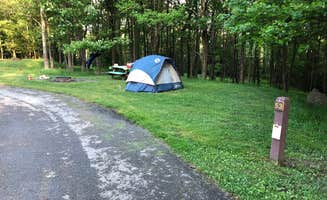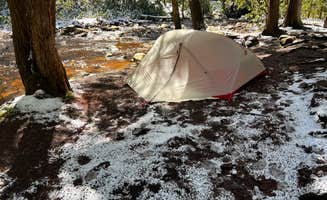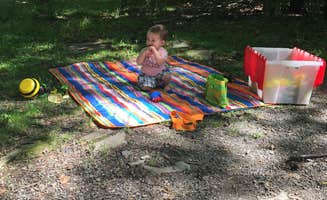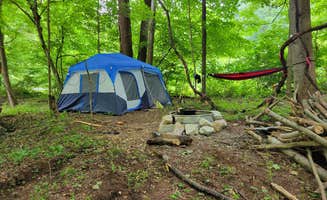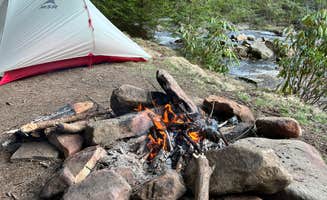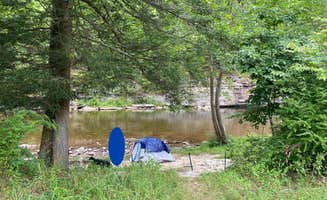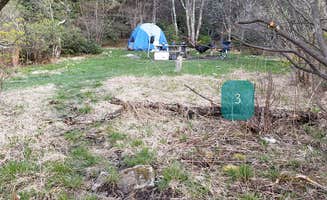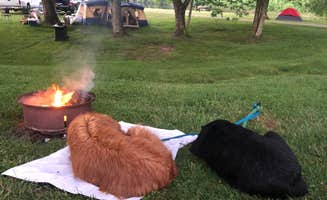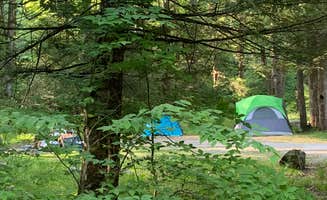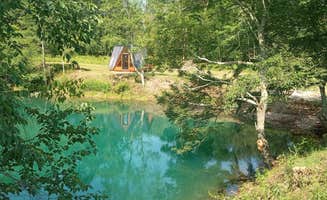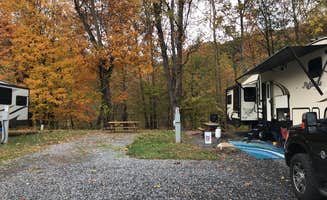The Davis area sits at elevations between 3,200-4,000 feet within the Monongahela National Forest, creating unique microclimates that can differ significantly from surrounding regions. This high-elevation camping destination experiences temperature swings of 20-30 degrees between day and night, even in summer. Forest roads to primitive camping areas typically open mid-April but can close without notice during severe weather events.
What to do
River activities: Five River Campground in Parsons provides direct access to the Shavers Fork River for fishing, wading and paddling opportunities. "We utilized the rv sites with 50 amp service and full hookups... The location is amazingly located right on the Shavers Fork river on a section that was shallow and calm enough for our small children to enjoy it... We walked up river to the end of the property and were able to tube down to the lower end of the property," notes one visitor who appreciated the riverside setting.
Mountain biking trails: Canaan Valley Resort State Park Campground connects to numerous biking paths of varying difficulty levels. "There are tons of Mountain Bike trails, indoor and outdoor pools," according to a camper. The park maintains over 18 miles of marked trails with maps available at the main lodge.
Spring wildflower viewing: Seneca Shadows offers proximity to spring wildflower displays typically peaking in April through early May. "We came here on a weekday with hardly anyone staying near us and rose around sunrise to catch the light over the rocks. it was such an easy and short distance to get there," one visitor reports. The campground's proximity to Seneca Rocks makes for excellent morning photography opportunities.
What campers like
Accessible waterfalls: Blackwater Falls State Park Campground provides easy access to multiple cascades within walking distance. "There's so much to do at this park! Multiple waterfalls, awesome hikes, a lake, a nature center for the kids, a petting zoo... the nearby towns of Davis and Thomas are very cute too with great coffee and food options," notes a camper who appreciated the variety of natural features.
Wildlife encounters: Brooklyn Heights Riverfront Campground offers natural habitats where wildlife observation opportunities abound. "Rustic, clean porta johns, private, primitive spots on river. Community fire rings on beach area. Firewood available. Relaxing," according to a recent visitor. The riverside location attracts numerous bird species during migration periods.
Night sky viewing: Canaan Loop Road Dispersed sites provide minimal light pollution for stargazing opportunities. "We found a nice site in the pine trees! Perfect for 2 vehicles and 5 people hammock camping!" one reviewer shared. The higher elevation camping spots above 3,500 feet offer particularly clear views of constellations on cloudless nights.
What you should know
Seasonal road limitations: Red Creek Campground access roads can become impassable during winter months without 4WD vehicles. "With a season of Mid-April through the beginning of December, be assured that weather is always a factor. Family has been thwarted at Thanksgiving by unpassable snow without a 4x4," cautions one experienced visitor.
Bathroom facilities vary dramatically: Many campgrounds offer basic amenities only, particularly at dispersed sites. At Lower Glady Dispersed Campground, "There is a very sharp turn if you come in from the south on Sully Road, which seems to be the primary way to get there. My Subaru Forester didn't have any issues, but if you're driving an RV or have a trailer, you may have a struggle."
Weekend congestion: Popular sites fill quickly from May through October, especially holiday weekends. "We tried to get a spot this weekend and arrived around 430pm on Friday. Every single spot was taken with many people who look like they have been set up there all summer," reported one disappointed camper attempting to use Lower Glady Dispersed Campground.
Tips for camping with families
Beginner-friendly fishing: Horseshoe Recreation Area provides accessible fishing spots ideal for young anglers. "Have been camping at Horseshoe annually for six years. Quite and remote. Great place to connect with family in the wide open spaces of West Virginia... Activities; hiking, tubing, swimming, fishing, and any game you can think of to play in the wide open fields," shares a regular visitor.
Protected play areas: Five River Campground features large open spaces away from traffic. "We utilized one of the rv sites with 50 amp service and full hookups... There's a wonderful park nearby that has a walking/biking trail, splash pad, and a large playground," notes a family camper.
Animal observation opportunities: Dolly Sods Backcountry offers unique ecosystem viewing experiences. "The amount of brightly colored fungi, snakes, crayfish and salamanders were astonishing. So if you move too quickly, you miss them," advises one visitor who enjoyed the biodiversity. The high-altitude meadows and bogs contain plant species normally found much further north.
Tips from RVers
Size restrictions: Many forest service roads have tight turns unsuitable for larger rigs. At Blackwater Falls State Park Campground, "The campground is only ok. Many of the pull thru sites are situated in the wrong direction with the electric hookup on the wrong side. The dump station is in a weird spot and the only water available is the same used for flushing," notes one RVer identifying practical challenges.
Hookup availability: Five River Campground offers some of the most reliable services in the area. "I really love Five River Campground in Parsons, WV. The owners are amazing! This campground is paved up to the campground. It has 120 RV sites many with full hook-ups. It can accommodate tents to large rigs. It has great cell signal for most carriers and even offers wifi and cable," reports a satisfied camper.
Leveling considerations: Prepare for uneven terrain at most campgrounds. "The sites are far apart. Bathrooms were OK. There are deer everywhere!" noted one RVer at Canaan Valley Resort State Park Campground. Many sites require leveling blocks as the mountain terrain creates natural slopes throughout camping areas.


